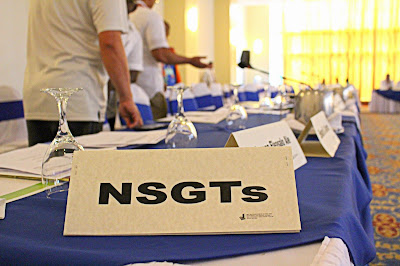Quest for Decolonization #5: The List
The United Nations keeps a list of non-self-governing
territories or places that remain colonies today that require assistance in
achieving decolonization. At one point this list, after World War II, the UN recognized 72 colonies. Over the years world events and the United Nations have helped push
this matter to the point where there are only 17 territories left in the world
that the UN recognizes as colonies.
These territories are:
Western Sahara
Anguilla
Bermuda
British Virgin Islands
US Virgin Islands
Cayman Islands
St. Helena
Falkland Islands
Montserrat
Turks and Caicos Islands
Gibraltor
American Samoa
French Polynesia
New Caledonia
Tokelau
Pitcarin Island
Guam
They are all primarily small islands in the Pacific and the
Atlantic. Most of them are colonized by either the US or the UK. They go by
many names. Territories. Overseas Territories. Possessions. Unincorporated
Territories. Protectorates.
It is good that the United Nations keeps this list, but if
you are looking for an understanding of colonialism in the world today, you
shouldn’t limit your analysis or investigation to only these locations. These
are not such much models of colonialism as it exists today, but rather the
remnants. They are the leftovers after empires have crumbled and been
dismantled. After wars for independence across the world forced open the greedy
fingers of a variety of colonizers to give up what truly never belonged to
them. These are the places which, to use a saying in English, have fallen
through the cracks. The ones that the gusto of decolonization in the past
missed, the ones who were not swept up by it.
These are all territories that deserve decolonization, that
deserve their shot at choosing their political destiny. This shouldn’t be
denied them regardless of how small they are. But, I mean it when I noted that
we shouldn’t use them as the exemplars of what colonialism, that chimera that
refuses to die, is today. Colonialism, in today’s language is something that
exists because of an interference with a polity’s sovereignty, where it has
been stolen, denied, deferred, whatever verb you would prefer to use. As a
result, basic self-governance is hindered in some ways that may be clear and
other ways more imperceptible.
But if we look around the world today we see many others
places which could be called colonial because of their situation today and the
way they seem to exist in a colonial relationship with another power. Native
Americans and other native peoples across the world, where semi-autonomous
zones have been carved out for them can very much be called colonies. Settler
colonial powers such as the United States, Canada, New Zealand and Australia
have spent centuries creating false foundations and legal mythologies for their
white nations. Because of this we tend not to call them colonizers for this or
those indigenous people within their lands colonies, but we very easily could.
Militarization, as some commentators have noted is at the
heart of new forms of colonialism today. Many of these commentators and
scholars miss the fact that militarization has always been a part of colonization,
as the empire is extended outward, interests and economic life-ways extend our
as well, and with it comes the pathological need to not only extract and
exploit, but also defend what is newly being dominated. The frontiers, the
borderlands, grey and red contact zones are also places where colonialism tends
to be alive and well, albeit with different names.
At last week’s UN Regional Seminar, many brought this into
the conversation, saying that many places where either recently or in times
past, one country has carved up another country into pieces, where military
bases mark, like war scars the lines of conflict, these can also be considered
colonies. The presence of foreign military bases represents a huge threat to a
nation’s sovereignty. Sometimes those bases are the result of treaties, but
often times those treaties were signed under duress, with the ashes and
detritus of battle still swirling around. They were written in such a way to
favor the owner of the basis and deprive the host of basic sovereign rights.
The US was often given as the nation which has created the most “colonies” in
this way, and whether people want to admit it or not, there is much truth to
that assertion.
The list however is always limited, just as the UN in
general is, by the willingness of the countries involved, to support it and
help it function. The list may appear to many as if it is a challenge to the
imperial possessions of countries, and it is, but it is, as the UN is in
general, built upon also a respect for the rights of nations, even those who
have colonies. Territories are only added to the list through cooperation with
the country who is doing the colonizing. This is one of the reason why
territories such as Puerto Rico, who have sought to be relisted for decades
cannot be relisted.
Even though there are plenty of strong arguments as to
expanding the list, it is unlikely to happen, as a country that were to permit
such things, is a country that must also be willing to address past crimes and
wrongs, and actually be willing to give up their control and parts of their
territory in order to fix such a wrong. Most of the countries today, especially
the larger and more powerful variety, would never allow such a shift in their
territorial and imperial integrity.




Comments